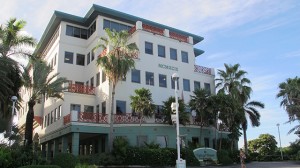
In this Aug. 3, 2012 photo, the Ugland House, the registered office for thousands of global companies, stands in George Town on Grand Cayman Island. (AP Photo/David McFadden)
So as we traveled across the Caribbean this week — including a stretch paralleling the south coast of Cuba past Guantanamo Bay and the Sierra Maestra mountains, where Castro and his revolutionaries once hid out — we made a stop in George Town on Grand Cayman Island. A short walk along the shore took us to 335 South Church Street, a location made famous by Barack Obama a few years ago and more recently, Jack Lew, during his confirmation hearings to become Secretary of the Treasury.
There you’ll find Ugland House, a five-story office building that, according to a 2008 report from the U.S. Government Accountability Office (GAO), houses 18,857 corporations, about half of which have billing addresses back in the States. It’s the business world equivalent of one of those circus cars that’s packed with more clowns than you thought possible. In 2009, Obama said of Ugland House, “either this is the largest building in the world or the largest tax scam in the world.”
In Foreign Policy magazine in January 2012, Joshua Keating wrote that in reality Ugland is neither but, “… the building makes a mockery of the U.S. tax system.”
Keating noted that the Caymans have no direct taxes, it only costs some $600 to set up a company address there – while the company does business around the world — and that “the Caymans also allow U.S. non-profit entities like pension funds and university endowments to invest in hedge funds without paying the ‘unrelated business income tax,’ which could be as high as 35 percent if those funds were based in the United States.” He also cited “concerns that the complexity and lack of transparency in Cayman Islands transactions can make tax evasion and money laundering easier, though,” he adds, “… the vast majority of Cayman Islands transactions are entirely legal.” This is what the Internal Revenue Service euphemistically described to the GAO as “the Cayman Islands’ reputation for regulatory sophistication.”
Ugland House offers one-stop shopping — it’s also headquarters for the international law firm Maples and Calder, experts at greasing the wheels for corporations wishing to do business via the Caymans. Recently, for example, it was announced that Maples and Calder is serving as Cayman Islands legal advisor to Seven Days Inn, a budget hotel chain in China. In a deal worth an estimated $688 million, Seven Days is being taken private by a consortium, the members of which include the Carlyle Group, the asset management company – third largest private equity firm in the world — whose past advisors and board members have included George H.W. Bush, former Secretary of State James Baker, former Defense Secretary Frank Carlucci and former British Prime Minister John Major. The consortium has lawyers in the Cayman Islands, too.
That may seem odd, given that, as Bloomberg News and others noted, Lew was managing director and chief operating officer of Citi Global Wealth Management, then moved in 2008 to Citi Alternative Investments, “which managed billions of dollars in private-equity and hedge-fund investments” — the kinds of deals that are as common in the Cayman Islands as piña coladas.
Granted, Lew has said on several occasions that he wasn’t responsible for Citigroup’s investment decisions. And true, $56,000 to many is minuscule compared to the aforementioned $688 million Chinese hotel deal, and may seem even less when stacked up against an estimated up to $11.5 trillion in offshore assets held worldwide. But as Iowa Republican Chuck Grassley pointed out to Lew at the Senate confirmation hearings, with his toe dipping into Cayman Islands-based funds, “You invested more money there than the average American makes in a year.”
And that’s the problem. Jack Lew is, by all accounts, a decent guy and dedicated public servant, but like so many of our recent treasury secretaries – Robert Rubin, Henry Paulson, Timothy Geithner – so deeply immersed in the old boy nexus of Wall Street and government as to have little comprehension of how, in the midst of a soaring Dow Jones, so many millions struggle to make ends meet. Nor, we fear, much willingness to resist when the next fiscal meltdown hits and the banks once more demand taxpayer billions to be taken off the hook they baited themselves.
In the weeks leading up to his swearing-in at Treasury, we learned how New York University, a non-profit, gave Jack Lew more than a million dollars in mortgage loans when he became executive vice president of operations there and a $685,000 severance when he left the university to join Citigroup – all at a time when student tuition fees were going through the roof (and NYU was receiving a kickback: .25 percent of net student loans from the bank it was pushing to students as a “preferred lender” — Citigroup). And we learned that Lew’s multimillion-dollar Citigroup contract included a $944,518 bonus if he moved on to a “full time high level position with the U.S. government or regulatory body.” (Remember, too, that in the years while Lew happened to be there, Citigroup’s stock lost 85 percent of shareholder value as it received $45 billion in taxpayer bailout cash.)
Jack Lew and his employers have provided seemingly logical explanations for all of these — Kevin Drum at Mother Jones magazine was told that Lew’s Citigroup bonus for moving to a government job, negotiated up front before said job happened, “avoids the problem of voluntarily either paying or not paying a big bonus to someone who will exercise power over it in the future.”
So keep your eye on Jack Lew’s stewardship of the nation’s bankbooks. You may know him by the company he keeps. As the poet wrote, no man is an island — Cayman or otherwise.

